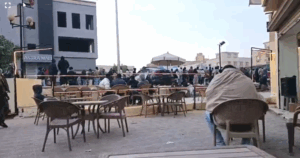Darfur prices soar as 3,000 flee violence in Chad
Displaced people in Kalma, Dereig, El Salam, and Otash camps for the displaced in Nyala in South Darfur have complained about the shortage of water and the soaring price of public transportation. The Humanitarian Aid Commission (HAC) in North Darfur confirmed the registration of 3,000 people who fled the recent intercommunal violence in East Chad to North Darfur.
 A baker prepared dough in El Fasher, North Darfur (File photo: Unamid)
A baker prepared dough in El Fasher, North Darfur (File photo: Unamid)
Displaced people in Kalma, Dereig, El Salam, and Otash camps for the displaced in Nyala in South Darfur complained about the shortage of water and the soaring price of public transportation. The Humanitarian Aid Commission (HAC) in North Darfur confirmed the registration of 3,000 people who fled the recent intercommunal violence in East Chad to North Darfur.
Sheikh Abdelkarim Juma from Otash camp told Radio Dabanga that the price of a gallon of water and public transportation tariffs have doubled in Nyala because of the fuel crisis.
The government Humanitarian Aid Commission (HAC) in North Darfur reported they have registered 3,000 people who fled the recent tribal disputes in eastern Chad to the Sudanese border town El Tina.
HAC confirmed that the registration processes was carried out in coordination and cooperation with UNHCR and the International Organisation for Migration (IOM).
In a press statement on Monday, Ibrahim Hamid, the state’s Humanitarian Aid Coordinator, said that his administration managed, in coordination and cooperation with the IOM, to register and classify those fleeing from Chad to El Tina.
He pointed out that the registration showed that 3,000 people fled from Chad, most of them Sudanese living in eastern Chad, but also 165 Chadian families.
Hamid said that HAC provided 70 tons of food, 1,000 plastic sheets, and a water tank for the affected people.
In Zalingei, the head of the Technical Committee for the Distribution and Observation of Flour in Central Darfur, Mohamed Khamis, announced that the authorities formally set the price of a 70-gram loaf of bread at SDG 5 ($0,09*) for commercial bakeries and one Pound and SDG 1.50 per 50 grams of subsidised bread.
In a press statement, Khamis said that the locality formed a committee to monitor bakeries, control quality, weight, and price, and review licenses and certifications.
* USD 1 = SDG 55.1375 at the time of posting. As effective foreign exchange rates can vary in Sudan, Radio Dabanga bases all SDG currency conversions on the daily middle US Dollar rate quoted by the Central Bank of Sudan (CBoS).
Radio Dabanga’s editorial independence means that we can continue to provide factual updates about political developments to Sudanese and international actors, educate people about how to avoid outbreaks of infectious diseases, and provide a window to the world for those in all corners of Sudan. Support Radio Dabanga for as little as €2.50, the equivalent of a cup of coffee.












 and then
and then